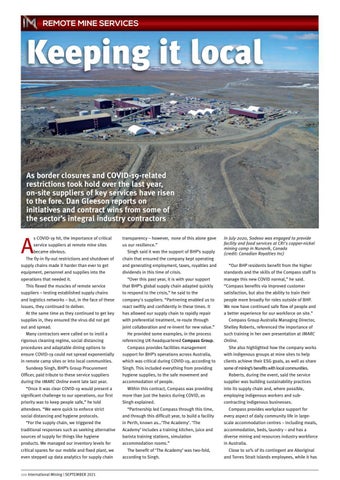REMOTE MINING SERVICES.qxp_proof 25/08/2021 11:42 Page 1
REMOTE MINE SERVICES
Keeping it local
As border closures and COVID-19-related restrictions took hold over the last year, on-site suppliers of key services have risen to the fore. Dan Gleeson reports on initiatives and contract wins from some of the sector’s integral industry contractors s COVID-19 hit, the importance of critical service suppliers at remote mine sites became obvious. The fly-in fly-out restrictions and shutdown of supply chains made it harder than ever to get equipment, personnel and supplies into the operations that needed it. This flexed the muscles of remote service suppliers – testing established supply chains and logistics networks – but, in the face of these issues, they continued to deliver. At the same time as they continued to get key supplies in, they ensured the virus did not get out and spread. Many contractors were called on to instil a rigorous cleaning regime, social distancing procedures and adaptable dining options to ensure COVID-19 could not spread exponentially in remote camp sites or into local communities. Sundeep Singh, BHP’s Group Procurement Officer, paid tribute to these service suppliers during the IMARC Online event late last year. “Once it was clear COVID-19 would present a significant challenge to our operations, our first priority was to keep people safe,” he told attendees. “We were quick to enforce strict social distancing and hygiene protocols. “For the supply chain, we triggered the traditional responses such as seeking alternative sources of supply for things like hygiene products. We managed our inventory levels for critical spares for our mobile and fixed plant, we even stepped up data analytics for supply chain
A
100 International Mining | SEPTEMBER 2021
transparency – however, none of this alone gave us our resilience.” Singh said it was the support of BHP’s supply chain that ensured the company kept operating and generating employment, taxes, royalties and dividends in this time of crisis. “Over this past year, it is with your support that BHP’s global supply chain adapted quickly to respond to the crisis,” he said to the company's suppliers. “Partnering enabled us to react swiftly and confidently in these times. It has allowed our supply chain to rapidly repair with preferential treatment, re-route through joint collaboration and re-invent for new value.” He provided some examples, in the process referencing UK-headquartered Compass Group. Compass provides facilities management support for BHP’s operations across Australia, which was critical during COVID-19, according to Singh. This included everything from providing hygiene supplies, to the safe movement and accommodation of people. Within this contract, Compass was providing more than just the basics during COVID, as Singh explained. “Partnership led Compass through this time, and through this difficult year, to build a facility in Perth, known as…‘The Academy’. ‘The Academy’ includes a training kitchen, juice and barista training stations, simulation accommodation rooms.” The benefit of ‘The Academy’ was two-fold, according to Singh.
In July 2020, Sodexo was engaged to provide facility and food services at CRI's copper-nickel mining camp in Nunavik, Canada (credit: Canadian Royalties Inc) “Our BHP residents benefit from the higher standards and the skills of the Compass staff to manage this new COVID normal,” he said. “Compass benefits via improved customer satisfaction, but also the ability to train their people more broadly for roles outside of BHP. We now have continued safe flow of people and a better experience for our workforce on site.” Compass Group Australia Managing Director, Shelley Roberts, referenced the importance of such training in her own presentation at IMARC Online. She also highlighted how the company works with indigenous groups at mine sites to help clients achieve their ESG goals, as well as share some of mining’s benefits with local communities. Roberts, during the event, said the service supplier was building sustainability practices into its supply chain and, where possible, employing indigenous workers and subcontracting indigenous businesses. Compass provides workplace support for every aspect of daily community life in largescale accommodation centres – including meals, accommodation, beds, laundry – and has a diverse mining and resources industry workforce in Australia. Close to 10% of its contingent are Aboriginal and Torres Strait Islands employees, while it has










